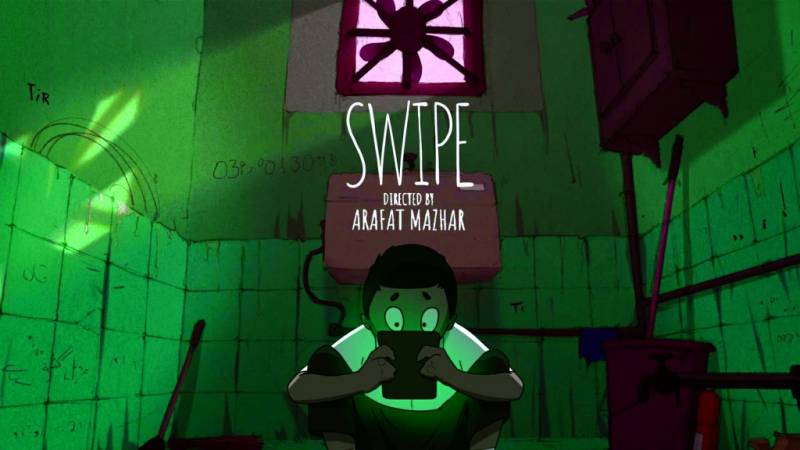
Jugnu is an ordinary boy from a middle-class family living in Lahore. Every morning he wakes up for school and begins another dreary day in the city. Sunlight refuses to filter through the grills on the windows. In the kitchen, his mother clangs pots and pans together, complaining about her kids. On the television blaring in the corner, two people on a talk show argue while the female host tries to keep things light. During breakfast his father is dialing numbers, trying desperately to prevent the landlord from evicting them. They have lived here for twelve years, his father says into the phone, how can they be kicked out just like that?
Jugnu goes to school where he and the other students doze off or throw things at each other in the middle of class and where the teacher doles out punishment without a second thought. The walk to and from school is punctuated by people gossiping on the roadside. Even the crows perched on the electricity poles cackle ominously as people walk by. Swipe gives us a glimpse into a world that is both joyless and all too familiar.
Only one thing in Jugnu’s life is shiny and full of promise. His high score on the iFatwa app means he is very close to becoming a Ghazi and securing a place on the Virtue Board. On iFatwa, the new app that has taken the city by storm, users get to decide whether errant citizens should be granted clemency or declared wajib-ul-qatl. If 10,000 users swipe right on a single offence, the citizen in question will be granted a death sentence. Some of the offences in question include a bride who chewed paan on her wedding night, a man who refused a gift of ajwa dates and a baby born with the sign of the Dajjal on his forehead.
Jugnu spends every waking moment on the app. It is the first thing he checks when he wakes up. He gets a few swipes in on the walk to and from school. In the bathroom, he squats on the toilet with his nose buried in his phone. As the movie progresses, and Jugnu becomes increasingly determined to get onto the Virtue Board, the offences he swipes right on become more and more absurd until he finally swipes right on his own father, sentencing him to death.
This is Puffball Studio’s second animated short film. The first, Shehr-e-Tabussum is set in a futuristic world filled with gadgets and neon colors where smiling is currency and failing to display gratitude towards the state is seditious. Both Swipe and Shehr-e-Tabussum explore what it feels like to be trapped in a world where everyone is watching each other in order to save themselves. At the end of Shehr-e-Tabussum, the protagonist refuses to smile any longer, signaling the possibility of a new beginning. But Swipe is a much darker piece. The protagonist is just a child playing a game who doesn’t realize the consequences of his actions until it is too late.
Puffball Studio’s Swipe comes at a time when it is clear that state surveillance has expanded to the realm of the internet. This year several apps, as well as an online videogame, have been banned by the PTA. Perhaps even more worrisome is how the Prevention of Electronic Crimes Act is regularly being weaponized against those who speak out against state policies. Since 2016, PECA has allowed for increased surveillance and harassment of citizens under the guise of regulating electronic crimes. Swipe speaks to this particular moment in Pakistan’s history. The app is an ever-looming threat, forcing citizens to police themselves in a manner that may not seem so far-fetched if PECA remains unamended in the next few years.
Is Swipe an articulation of how far we will go to prove ourselves virtuous? The film seems to suggest that winning is what matters the most to people. Give them a game and it doesn’t matter how high the stakes are, anyone will take a chance to be on top. But perhaps it is not that simple. The real story that Swipe tells lies in the details. Beyond the app, the film emphasizes the circumstances within which these characters live their lives. The cities with no sense of community, the schools that offer no support, the families that have no love to give. At Jugnu’s mother, disappointed by where her life had led her. At his father, unable to prevent the loss of their home. By prodding us to take a look at these lives, Swipe offers us a warning. If you prevent people from relating to the world in ways that are not violent then don’t be surprised when they turn on each other.
The author is a writer and activist. She can be contacted on Twitter @amnachaudhry03

Jugnu goes to school where he and the other students doze off or throw things at each other in the middle of class and where the teacher doles out punishment without a second thought. The walk to and from school is punctuated by people gossiping on the roadside. Even the crows perched on the electricity poles cackle ominously as people walk by. Swipe gives us a glimpse into a world that is both joyless and all too familiar.
Only one thing in Jugnu’s life is shiny and full of promise. His high score on the iFatwa app means he is very close to becoming a Ghazi and securing a place on the Virtue Board. On iFatwa, the new app that has taken the city by storm, users get to decide whether errant citizens should be granted clemency or declared wajib-ul-qatl. If 10,000 users swipe right on a single offence, the citizen in question will be granted a death sentence. Some of the offences in question include a bride who chewed paan on her wedding night, a man who refused a gift of ajwa dates and a baby born with the sign of the Dajjal on his forehead.
Jugnu spends every waking moment on the app. It is the first thing he checks when he wakes up. He gets a few swipes in on the walk to and from school. In the bathroom, he squats on the toilet with his nose buried in his phone. As the movie progresses, and Jugnu becomes increasingly determined to get onto the Virtue Board, the offences he swipes right on become more and more absurd until he finally swipes right on his own father, sentencing him to death.
This is Puffball Studio’s second animated short film. The first, Shehr-e-Tabussum is set in a futuristic world filled with gadgets and neon colors where smiling is currency and failing to display gratitude towards the state is seditious. Both Swipe and Shehr-e-Tabussum explore what it feels like to be trapped in a world where everyone is watching each other in order to save themselves. At the end of Shehr-e-Tabussum, the protagonist refuses to smile any longer, signaling the possibility of a new beginning. But Swipe is a much darker piece. The protagonist is just a child playing a game who doesn’t realize the consequences of his actions until it is too late.
Both Swipe and Shehr-e-Tabussum explore what it feels like to be trapped in a world where everyone is watching each other in order to save themselves
Puffball Studio’s Swipe comes at a time when it is clear that state surveillance has expanded to the realm of the internet. This year several apps, as well as an online videogame, have been banned by the PTA. Perhaps even more worrisome is how the Prevention of Electronic Crimes Act is regularly being weaponized against those who speak out against state policies. Since 2016, PECA has allowed for increased surveillance and harassment of citizens under the guise of regulating electronic crimes. Swipe speaks to this particular moment in Pakistan’s history. The app is an ever-looming threat, forcing citizens to police themselves in a manner that may not seem so far-fetched if PECA remains unamended in the next few years.
Is Swipe an articulation of how far we will go to prove ourselves virtuous? The film seems to suggest that winning is what matters the most to people. Give them a game and it doesn’t matter how high the stakes are, anyone will take a chance to be on top. But perhaps it is not that simple. The real story that Swipe tells lies in the details. Beyond the app, the film emphasizes the circumstances within which these characters live their lives. The cities with no sense of community, the schools that offer no support, the families that have no love to give. At Jugnu’s mother, disappointed by where her life had led her. At his father, unable to prevent the loss of their home. By prodding us to take a look at these lives, Swipe offers us a warning. If you prevent people from relating to the world in ways that are not violent then don’t be surprised when they turn on each other.
The author is a writer and activist. She can be contacted on Twitter @amnachaudhry03


